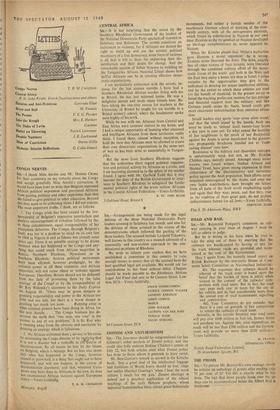CENTRAL AFRICA
Snt,—It is not surprising that the arrest by the Southern Rhodesian Government of the leaders of the National Democratic Party sparked off violence in Salisbury and Bulawayo. The arrests constitute an incitement to violence, for if Africans are denied the right to build up and use the normal political machinery of a free democracy, some form of violence is all that is left to them for expressing their dis- satisfaction and their desire for change. And the remarkable success of Julius Nyerere in building up the Tanganyika African National Union shows how skilful Africans can be in creating effective demo-, cratic organisations.
I am particularly concerned with the arrests, be- cause for the last sixteen months I have had a Southern Rhodesian African teacher living with me in Bristol. He has just returned home. He was a delightful person and made many friends here. Be- fore taking the one-year course for teachers at the University of Bristol he taught for six months in a Bristol primary school, where the headmaster spoke most highly of his work.
While he was with me, Africans from Central and East Africa were constant visitors to my home, and I had a unique opportunity of learning what educated and intelligent Africans from these territories really think. I found them, almost without exception, to hold the view that Africans must be allowed to create their own democratic organisations in the same sort of way as has been done so successfully in Tangan- yika.
But the news from Southern Rhodesia suggests that the authorities there regard political organisa- tion and political activity by Africans as a crime, and I am becoming alarmed as to the safety of my teacher friend. I agree with Mr. Garfield Todd that it may become the duty of the British Government to inter- vene in Southern Rhodesia to safeguard the funda- mental political rights of the seven million Africans in the Central African Federation.—Yours faithfully, R. ST. JOHN READE 3 Oakland Road. Bristol 6


































 Previous page
Previous page